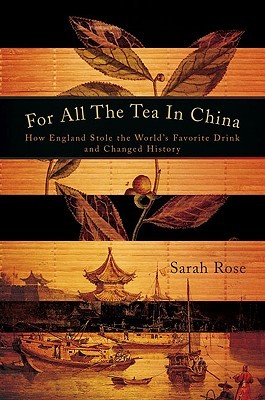Today I'm looking at For All the Tea in China, by Sarah Rose, which is a really good example of how I need to actually read the summaries for some of these books before I decide to check them out from the library. I thought this book would focus more on the Opium Wars where Britain forced China open to the opium trade to rectify a balance of payments problem with their importation of tons of tea from China. Instead, this book focuses more on the efforts of the East India Company to obtain tea plants, whether seeds or saplings, and transplant them in British-controlled India where they could significantly decrease both the costs of importing tea and the travel time to London. The book focuses largely on Robert Fortune, a Scottish botanist who spent several years in China gathering not only tea plants but other practical and ornamental plants which became very popular in the newly gardening-obsessed Britain.
Rose does briefly mention the Opium Wars as part of the historical background of the tea trade, and the need for Britain to stop silver from flooding out of Britain into China for the tons upon tons of tea that Britons were drinking every year. However the book mostly focuses on how the East India Company was going to lose their monopoly on the tea trade, and all other trade in Asia, and their attempts to reduce the costs of obtaining tea. If the Company was able to raise tea in Company-controlled India, they'd have a significant advantage over other companies that would still have to go to China for their tea. The problem, however, was that the methods of raising and producing tea were closely guarded secrets in China which no foreigner had been able to see.
As Rose states, Fortune was basically involved in an act of industrial espionage trying to steal trade secrets. And while I get the sense that's supposed to be frowned upon, I also get the feeling Rose sees it as a triumph of Western ingenuity. The version I listened to was actually read by Rose herself, so I assume all of the inflections and intonations in the reading are genuine to her intentions with the book. And I can't shake the feeling she looks on the imperial ambitions of Britain and the East India Company with something approaching pride. There's almost a skirting around the brutal treatment of foreigners in colonial systems, the ability of the Company to pay absurdly low wages for workers on their tea plantations in India which enabled much lower prices of tea overall. The theft and introduction of tea is seen not so much as one of many examples of European colonialism, but a daring adventure by swashbuckling heroes.
And that's honestly what bothers me the most about this book, the fact that it's fairly recent and feels almost supportive of British Imperialism. Maybe I'm seeing something that's not really there, but it's a vibe that I can't just seem to shake. My concern only grows because of Rose's free-market advocacy. Which isn't to say that there aren't many arguments still going on about the efficacy of the free market, but I feel like her assumption monopolies are inherently wasteful borders on the dogmatic. As an example she points out the East Indiamen merchant ships used by the Company. She argues that the large ships were slow and inefficient and it was only after the introduction of competition in the market that faster, sleeker ships were introduced. Ignoring the fact that well before the fastest of sailing ships were introduced, captains still had competitions to get their tea to London first because of the premiums the first shipment of tea would receive.
And finally there's Rose's argument, although I feel calling it an argument gives it too much credence, that the switch to tea from alcoholic drinks gave Britain an edge in industrialization. While seeing how the introduction of tea, as well as the calories from the sugar and milk added to tea, changed British society overall, I think saying it alone was responsible for making Britain an industrial powerhouse while France and Germany lagged behind because of a constantly inebriated population is bordering on the preposterous. Why Britain led Europe in industrialization is a complex question with multiple answers. Access to iron and coal that allowed the creation of steam engines and other mechanical devices, financial institutions and people with sufficient capital to finance innovations in machinery, and the demand for advances in a growing textile trade. While any one of these is insufficient alone to explain it, they all contribute to explain Britain's development as an industrial power. A shift from alcohol to tea seems insufficient.
I think my biggest problem isn't factual accuracy because as far as I can tell Rose did her research, it's more the interpretation that she takes from those facts which bothers me. She seems oddly pro-imperialism in her narrative, although again that's my own interpretation. She also advances some pretty tenuous theories which cast doubt onto a lot of her other work. Overall I guess the book is okay but it raises some doubts for me.
- Kalpar


No comments:
Post a Comment